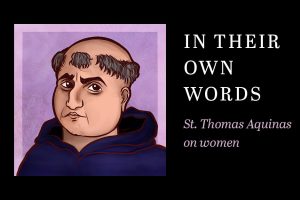On my 25th birthday a few weeks ago while staying at my parents’ house in the Colorado Rockies, I went on a long walk with my mom around a frozen lake. We talked about what she was like at my age and about my own hopes and dreams for this year. The question of dating and marriage came up, as it often does, not just with my mom but with my peers and friends, too. It’s hard for me to answer this question of what I want when it comes to relationships or vocational discernment. I am single, and throughout my 20s so far, I have not sought out dating, nor have I necessarily wanted to date.
From messages I get from both the church and society in general, it sometimes seems like being single in my 20s is seen as a transitory, stepping-stone stage of life before more permanent life decisions are made, like official vows of marriage or religious life. I recognize in myself, though, that I want to make commitments in the here-and-now of my life—to community, friendships, and the creative work of writing. They are vocational calls, because they are Spirit-driven and informed by the richness of my faith.
Ever since college I have been drawn to living in intentional communities, meaning living with others and sharing labor, resources, and presence. Right now I live in an intentional community in Chicago called The Fireplace, where my housemates and I live and work together to provide hospitality and community to artists, activists, and spiritual seekers while trying to prevent loneliness and burnout. I see the threads in my life and how a longing was placed in my heart for community. God led me to spaces where I can live that out.
I highly value friendship, too. I have friendships that are precious and holy to me, and I want to cultivate and give attention to them. I wish there were more ways to publicly honor friendship, not just romantic relationships.
My creative work of writing, I’m learning, requires me to be patient with it and in it for the long haul. I have to commit to it and trust in the process, returning again and again to the blank page, responding and surrendering to each nudge of the Spirit.
Vocation is way deeper than a job or label—it is an intimate call and given totally as a gift. How do I hold this gift well and develop a relationship with it? How do I courageously commit to what I know is true within me?
In the context of the institutional church, singleness is often not understood as a legitimate way to live unless one is a consecrated single. From the church, I hear that if I’m not interested in dating (and therefore marriage), I should think about religious life. From American culture I often hear that dating is a great way to discover things about myself: my likes, dislikes, and desires. While I think there is truth to these things, it creates pressure that I’m missing out on something I “should” be doing, even if it doesn’t necessarily feel authentic.
I think of my other single Catholic friends who don’t fit in neat vocational boxes—queer folks, women, older unmarried friends. It can be lonely sometimes to exist in webs of misunderstanding and assumptions, such as that I want to get married or that because I live with religious sisters I’m going to join religious life. I don’t know what the future will bring, and I’m trying my best to notice to what I am being called to say “yes” and “no.”
I’ve been thinking a lot about vows and vocations, ones made publicly and privately, recognized and unrecognized officially by institutions. This is because last summer, I saw a vow ceremony and was given a tour of a pottery studio, both at St. John’s University in Minnesota, that made me think about vocation in a whole new way.
The apprentice potter who gave me and a small group of writers a tour of the St. John’s pottery studio said that he and the other potters there have a deep commitment and relationship with the central Minnesotan land that gives them everything they need to create these earthy, spiritual pieces of art: the forming of the clay under the prairie, the soy growing in fields for glaze, the firing. Thousands of years are present in a hand-sculpted cup.
Earlier that day, I witnessed a profession of vows for a young monk at the Benedictine monastery, which is on the same campus as the pottery studio. Along with vows of conversion and obedience, the monks there make a vow of stability—meaning a vow to the physical place of the monastery and community.
The potter said he had discerned becoming a monk at St. John’s but decided not to. He feels, though, that he has made his own vow of stability to this place—to being a potter at this particular studio, rooted in the rhythms of work, a vow to this land. This life is his vocation.
What would it look like, one of the writers I was with wondered out loud, to make a vow to one’s creative work? What are other vows we make?
The commitments I make don’t have to be within the context of dating or jobs for them to be deeply formative and important to me. The church and parishes can offer young adults space and community to encourage one another and keep each other accountable in the commitments we are making, or want to make, to ourselves and to others, even if they are unconventional. Our 20s aren’t a limbo period. We are living out our vocations now—making mistakes, learning, and discovering the gifts we carry. These calls can be tied to jobs or official vows but aren’t always. Single Catholics should be able to claim ownership of the vocational calls they carry, too.
At the vow ceremony, the monk who was making his first vows sang, with arms outstretched, “God, disappoint me not in my hopes.”
That prayer resonated deep in my bones. In all stages of my life, I hope I’ll trust in the patience and courage it takes to live authentically. Disappoint me not in my hopes, wherever and however I find myself, in this vocation I’m living right now.
Image: Unsplash/Tamara Menzi















Add comment